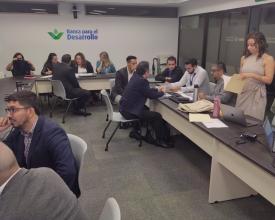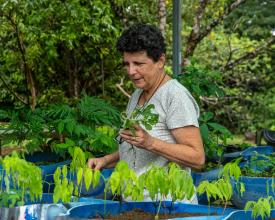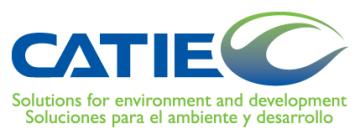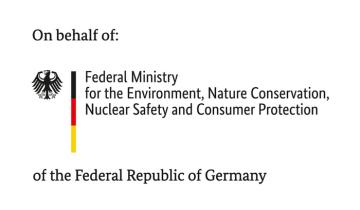
Seeding Success: Sustainable Financing for Climate-Resilient and Biodiversity-Positive Startups in Rural Communities
Successful implementation and scaling up of Ecosystem-based Adaptation (EbA) measures requires short-, medium- and long-term financing. Rural enterprises in agriculture, livestock, and community-based rural tourism are highly vulnerable to climate change and face particular challenges in investing in sustainable solutions. While EbA is an efficient strategy, its benefits often materialize over the long term, which delays the return on investment for land users.
Therefore, it is essential to secure stable sources of financing that allow land users to make investments, especially for entrepreneurs in rural areas. Non-reimbursable financing allows them to implement business plans that foster business resilience in the context of climate change. In Costa Rica, the EbA LAC program in partnership with the Development Banking System (SBD) and CATIE established a non-reimbursable financing program that promotes the creation, development and growth of resilient enterprises in rural areas called Adapt-ACTIVA
Context
Challenges addressed
In Costa Rica, a large part of the population works in natural resource-based activities like farming, livestock, and tourism, which are crucial for the country’s economy and rural development. However, the country is facing increasingly severe climate change impacts, including droughts, floods, and landslides, which affect production, the local economy, and rural communities.
Rural enterprises struggle to adapt to climate change due to limited technical resources, financing, and appropriate technologies. To build more resilient businesses, accessible financing mechanisms are essential. These mechanisms need to focus on strengthening rural enterprises that integrate climate change adaptation into their business strategy, improving their profitability and families’ quality of life.
Location
Process
Summary of the process
The foundation begins with an institutional framework putting climate change adaptation on the investment agenda of second-tier financial entities (SBD) with Building Block 1. It is followed by creating specific financial mechanisms for climate-resilient business models by planing open funding calls for seed capital (Building Block 2). This supports biodiversity-positive and climate-resilient startups in rural areas. These financial mechanisms work alongside non-financial support services, including coaching programs and technical guidance even during the application stage, which provide entrepreneurs with skills to identify and implement adaptation measures that strengthen initiatives’ resilience and profitability (Building Block 3).
This comprehensive approach drives sustainable economic growth, creates jobs, contributes to biodiversity conservation and restoration, and builds stronger, more resilient communities.
Building Blocks
Incorporating Climate Change into the Strategy of SBD
The Development Banking System (SBD), a second-tier financial entity of the Costa Rican state, has the mandate to provide financing for vulnerable individuals in rural Costa Rica at favorable rates, particularly focusing on women and youth. Though there are existing institutional policies and strategies at national and territorial levels, there are large gaps in integrating climate change adaptation as an investment priority for financial entities.
Until recently, climate change and the concepts of climate resilience and ecosystem-based adaptation (EbA) have been largely absent from the agenda of SBD. However, by providing training and capacity-building on these topics, the SBD can now pave the way for the development of innovative financial products and the enhancement of existing ones.
Additionally, developing monitoring and evaluation systems for financial products helps measure the impact of adaptation measures integrated into local enterprises' business models. This strengthens transparency and builds trust among the financial sector, beneficiaries, decision-makers, and international financiers.
Enabling factors
• Strong regulatory framework and public policies that incorporate climate change adaptation into national and territorial development strategy.
• Clear political commitment and alignment with the national climate agenda.
• Active institutions mandated to provide financial resources for rural ventures.
• Flexibility to modify existing financial instruments to include adaptation criteria.
• Strong institutional capability to collect, evaluate, and strategically use monitoring data
Lesson learned
• Building an enabling institutional framework for financing adaptation measures requires time and inter-institutional commitment. A staged approach with concrete steps allows for orderly progress and helps identify areas for improvement when scaling.
• Developing or adapting effective financial products requires close coordination and active consultation between the financial sector and potential clients.
• Integrating adaptation criteria into financial products needs a broad conceptual framework that encompasses both gray and green adaptation measures. The availability and channeling of international funds at competitive rates helps facilitate the financing of climate-resilient financial products.
Seed capital for climate-resilient business ideas (Non-repayable short-term financing)
Strengthening and consolidating climate-resilient rural ventures requires financing products that support these initiatives from inception. Rural entrepreneurs often encounter barriers to accessing traditional credit financing, particularly during the startup phase of their business models.
In this context, non-repayable funds—also known as seed capital—serve as a vital tool. This financing enables entrepreneurs to prototype promising ideas that can become dynamic ventures, fosters an entrepreneurial culture in rural territories, and provides crucial support during the early "valley of death" phase of business development.
This building block focuses on developing open public calls for seed capital funds that incorporate climate change adaptation criteria across business models. The design of these calls must include clear eligibility requirements for climate resilience, adaptation practices, and profitable business models with measurable socio-environmental impact. This financing can particularly benefit ventures led by youth, women, and vulnerable rural populations—making it essential to consider these demographics in the eligibility criteria
Enabling factors
• Institutional willingness to modify existing or create new seed capital programs that incorporate climate adaptation and resilience criteria.
• Network of seed capital agencies and strategic partners (incubators, accelerators) who understand and can provide technical assistance for integrating climate resilience into business models.
• Trained evaluation team capable of identifying adaptation measures in business models to ensure selection criteria support climate adaptation. Strong entrepreneurial culture and climate change awareness among young people that drives innovative, climate-resilient business models.
Lesson learned
• Combine seed capital funding with technical assistance like mentoring and incubation to help develop realistic business ideas suited to the local context and ensure long-term business sustainability.
• Include specific support measures for women, youth, indigenous peoples, and other historically excluded groups to ensure equal access to financing opportunities.
• Design realistic processes and timelines that match the venture's development stage. Make application forms clear, accessible, and appropriate for the target entrepreneurs.
• Create outreach strategies that engage key rural stakeholders to maximize participation and diversity in funding calls.
• Consolidate climate-resilient startups by providing medium- and long-term financing options that support business growth
Resources
Coaching program for integrating EbA and climate resilience into business models during application stage
Providing entrepreneurs with technical tools is essential for integrating adaptation measures into their business models and increasing their climate resilience. This building block combines financial mechanisms in building block 2 with non-financial services—including coaching programs and specialized technical assistance—to support entrepreneurs from the pre-incubation through incubation stages. A special aspect is that this coaching is not only provided after the successful application of entrepreneurs but also during the application phase. Thus supporting good ideas to become successful, climate-resilient businesses that incorporating EbA measures into their business models.
The training builds foundational knowledge of climate change, territorial vulnerability, and sector-specific adaptation measures and the individualized support strengthens entrepreneurs' abilities to develop financing proposals, create sustainable business plans, and identify context-appropriate marketing strategies.
The coaching program also facilitates networking among entrepreneurs to integrate their ventures into local and national value chains and markets. Business fairs and exchange events are key components of the program design.
This comprehensive approach strengthens entrepreneurial competencies while ensuring investments and financing create meaningful impact on climate resilience and local development
Enabling factors
• Success requires a robust local entrepreneurship ecosystem with technically skilled financial operators, innovation centers, incubators, and universities that can develop specialized coaching programs and nurture local entrepreneurial culture.
• A supportive institutional framework (Building Block 1) must acknowledge entrepreneurship's vital role in local development and its connection to climate resilience.
• Close coordination with seed capital opportunities—through the Development Banking System (SBD) or other financing sources—helps entrepreneurs put their learning into practice and access resources for their business ideas.
• Incubation and acceleration agencies need both an understanding of climate change impacts and technical expertise in developing climate-resilient business models.
Lesson learned
• Having local technical staff provide close follow-up with entrepreneurs is crucial for building trust. This trust facilitates learning and encourages entrepreneurs to incorporate climate change adaptation measures into their business models.
• In rural contexts, program content must be tailored to participants' backgrounds. While the training is technical, participation and impact decrease when content is overly complex or disconnected from participants' daily experiences.
• Fostering an entrepreneurial culture in rural communities is vital—it creates self-employment opportunities in areas facing both climate vulnerability and social challenges, including limited access to education and jobs.
Resources
Impacts
There have been two successful calls for proposals conducted between 2023 and 2024, benefiting 55 ventures (35 women-led and 20 men-led). The SBD and entrepreneurs contributed a total of USD 707,000. In the first call, entrepreneurs received USD 10,000 in non-reimbursable seed capital and contributed USD 1,100 as their counterpart. The third call, launched in March 2025, aims to support 35 more entrepreneurs with approximately USD 300,000. This brings the total investment to USD 1 million over three years, benefiting 90 entrepreneurs in highly vulnerable rural communities affected by climate change and socio-economic challenges.
The measures applied depend on the business models and their level of vulnerability to climate change. For example, in livestock farming, the introduction of silvopastoral systems, live fences and forest conservation as shade for the animals, as well as water harvesting systems contributed to animal welfare and, therefore, to better milk and meat quality.
Beneficiaries
El Sistema de Banca para el Desarrollo (SBD), ACTIVA , Entrepreneurs and small and medium-sized enterprises
Global Biodiversity Framework (GBF)
Sustainable Development Goals
Story
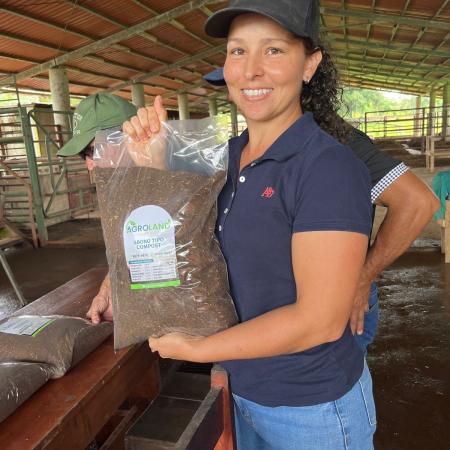
Transforming Land, Transforming Life: Wendy's Story
In the green hills of La Palmera in San Carlos, Costa Rica, Wendy Hidalgo has achieved something extraordinary: transforming the degradation of her family farm into a model of sustainability and climate change adaptation. What began as a concern about soil deterioration has become an ecological business with community impact, thanks to the support of the Adapt-ACTIVA initiative of the EbA LAC program and the accompaniment of Activa CATIE.
"The grass wasn't growing, the manure wasn't decomposing... The soil was screaming at us that it needed help," Wendy recalls. The farm, run by her and her husband, was showing signs of exhaustion. But instead of giving up, Wendy saw an opportunity.
Using livestock waste and knowledge acquired with support from the Ministry of Agriculture and the EbA LAC program, Wendy began to produce compost and biofertilizers, revolutionizing the productivity of her soils and reducing the use of chemicals.
Through the Adapt-ACTIVA initiative Wendy received not only seed capital for equipment, but also strategic mentoring. "I had a lot of ideas, but they helped me focus them. I learned to identify my clients, to use social networks... and even to lose my fear," she confesses.
Wendy's enterprise implements not only good business practices but also ecosystem-based adaptation measures: planting shade trees, conserving the forest, harvesting rainwater and protecting biodiversity. Wendy also provides workshops for others to learn how to produce their own bio-inputs, replicating the knowledge in her community.
The results were not long in coming. The pastures revived, earthworms appeared in the soil and producers from the area began to visit the farm, interested in her products. What started as an idea is now a constant source of income for her family. Today, Wendy not only sells to local farmers, but also dreams of opening an agrotourism center and a fair space for rural women entrepreneurs.
But her motivation goes beyond business: "What moves me is to leave something good for my children and my community. I get tired, of course, but I am passionate about knowing that I am doing something useful for the environment and for the people." Even her father, who used to cut down trees, now asks for saplings to plant on his farm. “He's already changed his mind,” she says with a laugh.
Wendy demonstrates that climate change is not only faced with large investments, but also with commitment, creativity and love for the land.
